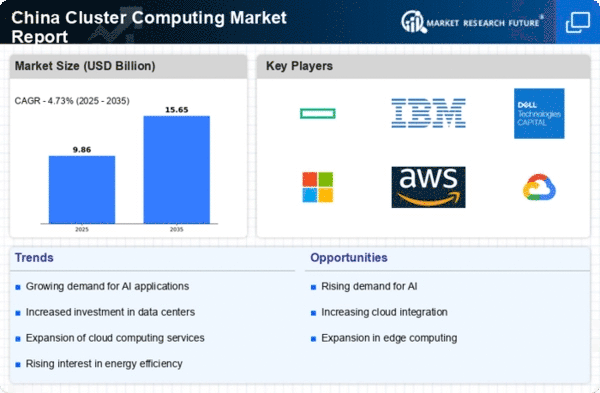Rising Demand for Big Data Analytics
The increasing reliance on data-driven decision-making is propelling the cluster computing market in China. Organizations across various sectors are recognizing the value of big data analytics to enhance operational efficiency and customer insights. As a result, the demand for high-performance computing solutions is surging. According to recent estimates, the big data analytics market in China is projected to reach approximately $60 billion by 2025, indicating a robust growth trajectory. This trend is likely to drive investments in cluster computing technologies, as businesses seek to process vast amounts of data quickly and effectively. The cluster computing market is thus positioned to benefit from this growing need for advanced analytics capabilities, enabling organizations to harness the full potential of their data assets.
Emergence of Edge Computing Solutions
The rise of edge computing is reshaping the landscape of the cluster computing market in China. As businesses seek to process data closer to the source, the integration of cluster computing with edge devices is becoming increasingly prevalent. This approach allows for reduced latency and improved performance in applications such as IoT and real-time analytics. The edge computing market in China is anticipated to grow significantly, potentially reaching $20 billion by 2025. This growth presents opportunities for the cluster computing market to innovate and develop solutions that cater to the unique demands of edge computing, ultimately enhancing the overall efficiency and responsiveness of data processing.
Increased Focus on Cybersecurity Solutions
As cyber threats continue to evolve, the cluster computing market in China is witnessing a heightened emphasis on cybersecurity solutions. Organizations are increasingly deploying cluster computing systems to enhance their security measures, leveraging the computational power to analyze threats and respond in real-time. The cybersecurity market in China is projected to grow to approximately $30 billion by 2025, indicating a strong demand for advanced security technologies. This trend suggests that the cluster computing market will play a crucial role in supporting organizations' efforts to safeguard their data and infrastructure against cyberattacks, thereby fostering a more secure digital environment.
Advancements in Cloud Computing Technologies
The evolution of cloud computing technologies is significantly influencing the cluster computing market in China. With the rise of cloud-based solutions, organizations are increasingly adopting cluster computing to enhance their computational capabilities. The integration of cluster computing with cloud services allows for scalable and flexible resource allocation, which is essential for handling complex workloads. As of 2025, the cloud computing market in China is expected to exceed $100 billion, creating a favorable environment for the cluster computing market. This synergy between cloud computing and cluster technologies is likely to foster innovation and drive the development of new applications, further solidifying the role of cluster computing in the digital transformation of enterprises.
Growing Need for High-Performance Computing in Research
The cluster computing market in China is experiencing growth due to the escalating demand for high-performance computing (HPC) in research and development sectors. Academic institutions and research organizations are increasingly utilizing cluster computing to conduct complex simulations and data analyses. This trend is particularly evident in fields such as genomics, climate modeling, and materials science, where large-scale computations are essential. The Chinese government has been investing heavily in HPC infrastructure, with plans to allocate over $10 billion towards supercomputing initiatives by 2025. This investment is likely to enhance the capabilities of the cluster computing market, enabling researchers to tackle more ambitious projects and accelerate scientific discoveries.
















